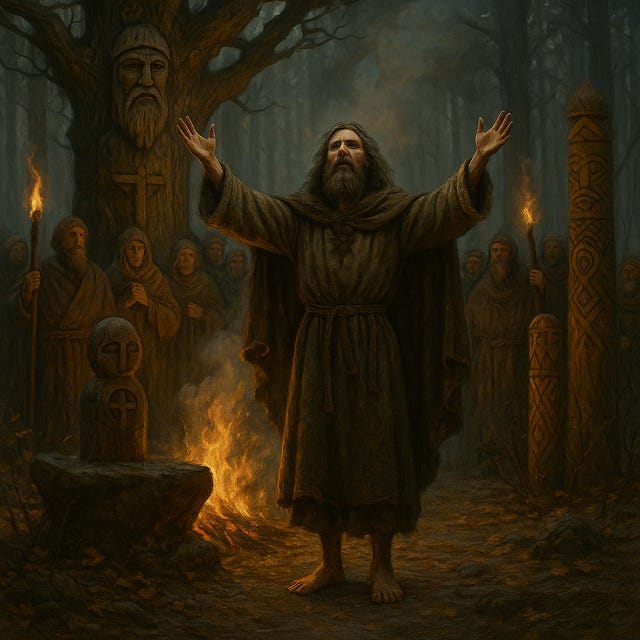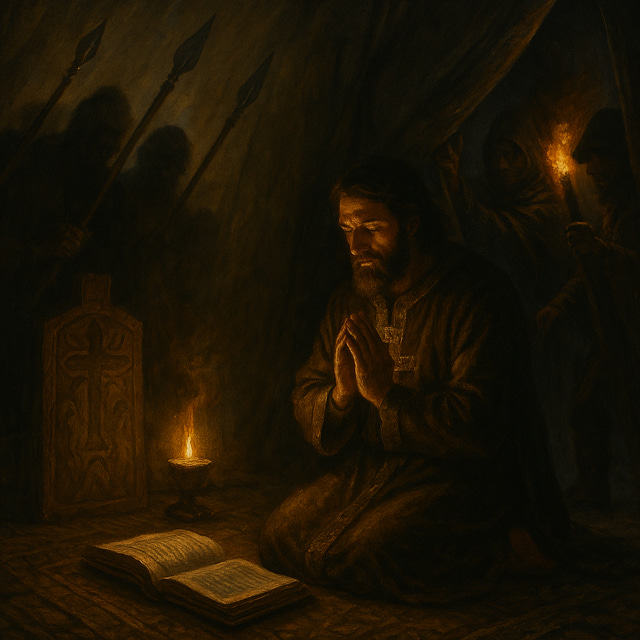The Grove and the Gate: When Kyiv Rewrote the Faith and Russia Never Rose
Whose Dynasty Is It Anyway? A Series Of Little Known Inheritance Conflicts. War of Spanish Succession? Heard it. War of Austrian Succession? So done. How about…
What if the pagan uprisings of the early 11th century overwhelmed both Orthodoxy and the princely state—birthing a pluralistic, Kyiv-led sacred order, and leaving Muscovy in the shadows?
En Route to Real History: The Kyivan Succession Crisis (1015–1019)
When Vladimir the Great died in 1015, he left behind a freshly baptized realm, dozens of sons, and zero instructions. None. Nihil. Zilch. Nada. Calling the Kyivan Rus' gifted by Vladimir a “succession crisis” would be putting it charitably, it was a sanctified slaughter.
Sviatopolk the Accursed—now this moniker is well deserved—made the first move, murdering his brothers Boris and Gleb in cold blood. The victims became saints. The killer became king. For a minute.
But from the northern wilds came Yaroslav, prince of Novgorod—armed with a mercenary fleet, a grudge, and the growing support of the Church. He fought Sviatopolk three times over four years, finally crushing him at the Battle of the Alta River in 1019.
Yaroslav the Wise emerged victorious as grand prince of Kyiv. Yaroslav also became sort of a founding father of a golden age. He built cathedrals, codified law, married his daughters into European royalty, and turned Kyiv into the Orthodox Jerusalem of the Slavs.
But the cost? Fraternal blood. Pagan backlash. A fragile unity forged by war and wrapped in Byzantine silk.
The Russian Orthodox Church would later claim this era as its divine inheritance. We won’t bore you with the Norman vs. anti-Norman historiography of this and the seven centuries later “Russia.” Let’s just say one is favored by the Soviets and Putin then the other is, well, real history.
However, for our purposes, there was a brief flicker where the story could’ve gone anywhere.
And Kyiv—ripe with doubt, rage, and sacred possibility—almost did go another way.
Prologue: The Forest Waits

In the deep woods east of Polotsk, where the pines speak in riddles and the birch trees bleed in spring, a fire cracked under pagan stars. The year was 1016. The Christian princes were busy slaughtering one another for Vladimir’s bones. So, just another Tuesday. But in the grove, a different reckoning stirred. A barefoot prophet in a cloak of wolf pelts—Velimir the Grove-Speaker—raised a carved idol and roared,
“Their god made them prince. Ours will make us prophesy. A turning of the tide. A wind which whips from beneath.”
Thus, in our rerouted world, began the Uprising of the Roots.
The Succession Crisis Splinters the Cross
Vladimir the Great died in the winter of 1015, not with a whimper of a last breath, but with the sound of steel being sharpened in every corner of his disjointed Kyivan Rus'. He had converted the people of Rus’ to Christianity by sword and sermon, but not by trust. And certainly not by clarity.
He had over a dozen sons. He named none heir.
Every blow was struck in the name of a God barely understood by those of the forests and the fields. And, it was all for a crown no one had earned.
The Accursed Strikes First, Because, Of Course
Sviatopolk, Vladimir’s eldest by marriage but not by blood, moved like a man possessed. Within days of Vladimir’s death, he had seized Kyiv and sent riders to ambush his half-brother Boris on the banks of the Alta River. Boris had been praying in his tent—mourning their father, not planning a war. He did not fight. He did not run.
The soldiers entered under darkness. They drove spears through Boris as he sang psalms. Then they strangled him for good measure.

Gleb, the youngest and most innocent, was lured by false summons and murdered mid-prayer, his body dumped in a swamp outside Smolensk. The swamp was later said to glow at night.
Thus, did Sviatopolk become the first to shed Christian blood upon Christian soil and the first to bathe in it.
But the Cross did not shield him. It splintered.
Yaroslav’s Ice-Fanged Return
To the north, in Novgorod, Yaroslav learned of the murders. His hair had grayed early—some said from reading too many Greek treatises, others from watching too many brothers die. He had ruled Novgorod as a near-Scandinavian city-state, distant from the center but rich in warriors and silver.
He wasted no time.
Keep reading with a 7-day free trial
Subscribe to ReRouted By History to keep reading this post and get 7 days of free access to the full post archives.





